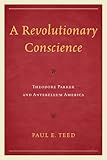A revolutionary conscience : Theodore Parker and antebellum America / Paul E. Teed.
Material type: TextPublisher: Lanham : University Press of America, [2012]Copyright date: ©2012Description: 1 online resource (xviii, 290 pages)Content type:
TextPublisher: Lanham : University Press of America, [2012]Copyright date: ©2012Description: 1 online resource (xviii, 290 pages)Content type: - 9780761859642
- 0761859640
- Parker, Theodore, 1810-1860
- Parker, Theodore, 1810-1860
- Unitarian churches -- United States -- Clergy -- Biography
- Antislavery movements -- United States
- Abolitionists -- United States -- Biography
- Églises unitariennes -- États-Unis -- Clergé -- Biographies
- Mouvements antiesclavagistes -- États-Unis
- Abolitionnistes -- États-Unis -- Biographies
- RELIGION -- Christianity -- Denominations
- Abolitionists
- Antislavery movements
- Unitarian churches
- United States
- 289.1/092 B 23
- BX9869.P3
- online - EBSCO
| Item type | Current library | Call number | URL | Status | Notes | Barcode | |
|---|---|---|---|---|---|---|---|
 eBook
eBook
|
Biblioteca "Angelicum" Pont. Univ. S.Tommaso d'Aquino Nuvola online | online - EBSCO (Browse shelf(Opens below)) | Online access | Not for loan (Accesso limitato) | Accesso per gli utenti autorizzati / Access for authorized users | (ebsco)521749 |
Browsing Biblioteca "Angelicum" Pont. Univ. S.Tommaso d'Aquino shelves, Shelving location: Nuvola online Close shelf browser (Hides shelf browser)
Includes bibliographical references (pages 273-284) and index.
Theodore Parker was one of the most controversial theologians and social activists in pre-Civil-War America. A vocal critic, of traditional Christian thought and a militant opponent of American slavery, he led a huge congregation of religious dissenters in the very heart of Boston, Massachusetts, during the 1840s and 1850s. This book argues that Parker's radical vision and contemporary appeal stemmed from his-abiding faith in the human conscience and in the principles of the American revolutionary tradition. A leading figure in Boston's resistance to the Fugitive Slave Law, Parker became a key supporter of John Brown's dramatic but ill-fated raid on Harper's Ferry in 1859. Propelled by a revolutionary conscience, Theodore Parker stood out as one of the most fearless religious reformers and social activists of his generation.
"Bred up amid the memories" -- Divinity school and beyond -- Spiritual indifference -- The transcendentalist controversy -- the making of a public radical -- A reckoning with ministers -- Church and society -- Classes, families and reform -- Slavery, politics and the revolution -- Making antislavery culture -- Conscience and the Fugitive Slave Act -- Continual alarms -- Race, politics and antislavery violence -- Conscience, politics and religion -- The Anthony Burns crisis -- The politics of confrontation -- The idea that blood must flow -- Principles, parties and partings -- The final journey.
Description based on print version record and CIP data provided by publisher; resource not viewed.









